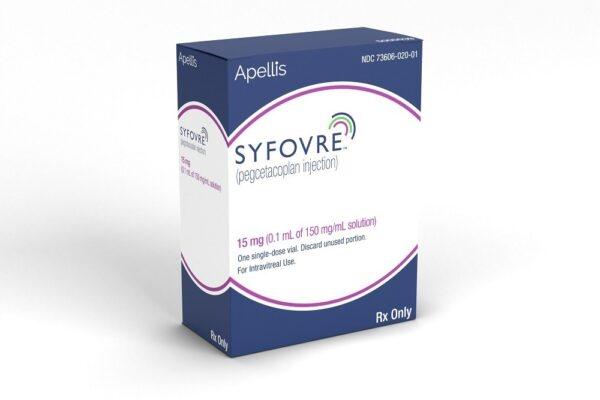Apellis breaks new ground in geographic atrophy

Apellis Pharma has become the first company to claim FDA approval for a drug to treat geographic atrophy (GA), a sight-robbing condition that accompanies age-related macular degeneration (AMD) – one of the leading causes of blindness.
The US regulator has cleared the company’s complement C3 inhibitor pegcetacoplan as an intravitreal injection called Syfovre for GA, which affects more than 5 million people worldwide, including nearly one million people in the US.
A subcutaneous formulation of the drug called Empaveli is already approved by the FDA as a treatment for rare blood disorder paroxysmal nocturnal haemoglobinuria (PNH), making around $45 million in sales in the first nine months of 2022, but approval in GA is seen by analysts as the key to unlocking that some analysts see as blockbuster sales potential for the drug.
While there are multiple therapies available for the wet form of AMD, there have so far been no treatment options for patients with the disease who go on to develop GA – an advanced form of the disease characterised by the loss of photoreceptors and retinal pigment epithelial (RPE) cells, the central portion of the retina known as the macula.
The injectable drug showed its value in a pair of phase 3 trials, called OAKS and DERBY, which initially generated mixed results for the drug, but saw the results grow stronger with longer follow-up.
In OAKS, monthly and every-other-month treatment with pegcetacoplan respectively showed 22% and 18% reductions in GA lesion growth compared to control at 24 months, while for DERBY reductions were 18% and 17%, all of which passed the threshold for statistical significance.
“With its increasing effects over time and flexible dosing, we believe that Syfovre will make a meaningful difference in the lives of people with GA,” said Apellis’ chief executive, Cedric Francois.
The company has said it plans to launch the treatment in March, at a cost of $2,190 per vial, with patients receiving the therapy every 25 to 60 days. Empaveli costs around $450,000 per year for PNH in the US, ahead of discounts or rebates.
Jefferies analysts have estimated Syfovre could make as much as $6 billion in yearly sales at its peak, but Apellis has potential competition to Syfovre coming through the industry pipeline.
That includes Iveric Bio’s complement C5 inhibitor avacincaptad pegol, which is under review by the FDA, with a verdict due by 19th August. Also in development is NGM Biopharmaceuticals’ NGM621, another complement C3 inhibitor currently in the phase 2 CATALINA study, which has attracted an option deal from Merck & Co.
Annexon Biosciences, meanwhile, is developing a complement C1q inhibitor, ANX007, that is in the phase 2 ARCHER study in GA, while Ionis has an antisense drug targeting complement factor B in the mid-stage GOLDEN trial.
Outside of the complement category, Roche is running the phase 2 GALLEGO study of anti-inflammatory therapy FHTR2163, while Stealth BioTherapeutics and Allegro Ophthalmics are developing drugs designed to reduce oxidative stress in the retina – elamipretide and risuteganib, respectively – which are both in phase 2b/3 testing.













